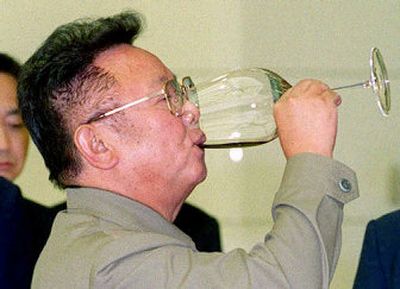U.S. targeting Kim Jong Il’s swanky lifestyle

WASHINGTON – In a novel effort targeting the lifestyle of North Korea’s eccentric president, the Bush administration wants to make it tougher for him to buy iPods, plasma televisions, Segway electric scooters and more.
It is Washington’s first attempt to use trade penalties as a way of personally aggravating a foreign leader. They target items believed to be favored by Kim Jong Il or presented by him as gifts to the roughly 600 loyalist families who run the communist government.
Kim, who orchestrated a secret nuclear weapons program despite international efforts to stop him, has other options for obtaining high-end consumer electronics and other luxuries.
But the list of proposed U.S. penalties, obtained by the Associated Press, aims to make Kim’s swanky life harder: No more cognac, Rolex watches, cigarettes, artwork, expensive cars, Harley-Davidson motorcycles or even personal watercraft, such as Jet Skis.
The ban would extend even to musical instruments and sports equipment. The 5-foot-3 Kim is an enthusiastic basketball fan; Secretary of State Madeleine Albright presented him with a ball signed by Michael Jordan during a rare diplomatic trip in 2000.
“While North Korea’s people starve and suffer, there is simply no excuse for the regime to be splurging on cognac and cigars,” Commerce Secretary Carlos M. Gutierrez said Wednesday in a statement. “We will ban the export of these and other luxury goods that are purchased for no other reason than to benefit North Korea’s governing elite.”
Gutierrez said penalized items were “carefully considered and carefully targeted.”
Experts said the U.S. luxury sanctions would be the first ever to curtail a specific category of goods not associated with military buildups or weapons designs – and the first tailored to annoy a foreign leader. They acknowledge that enforcing the ban on black-market trading would be difficult.
“He’s got folks who can move around nuclear weapons. If he tells these guys to get him a case of scotch, they’re going to pull it off,” said James A. Lewis, a former State Department official who worked on arms controls.
In Beijing, U.S. and North Korean diplomats failed to reach agreement on when they might resume disarmament negotiations on Kim’s atomic weapons program. Japan’s Kyodo News agency cited unidentified people at the talks as saying that Kim demanded that the U.S. freeze the penalties on luxury goods and other items imposed after the North’s first nuclear test on Oct. 9.
The new trade ban would forbid U.S. shipments there of Rolexes, cognac, plasma TVs, yachts and more – all items favored by Kim but unattainable by most of the country.
“It’s a new concept. It’s kind of creative,” said William Reinsch, a former senior Commerce Department official who oversaw trade restrictions with North Korea under President Clinton.
Reinsch predicted governments will comply with the restrictions, but agreed trying to block all underground shipments will be frustrating.
Defectors to South Korea have described Kim giving expensive gifts of cars, liquor and Japanese-made appliances to his most faithful bureaucrats.
“If you take away one of the tools of his control, perhaps you weaken the cohesion of his leadership,” said Robert J. Einhorn, a former State Department official who visited North Korea with Albright and dined extravagantly there. “It can’t hurt, but whether it works, we don’t know.”
In response to North Korea’s nuclear test Oct. 9, the U.N. Security Council banned military supplies and weapons shipments. It also banned sales of luxury goods, but so far has left each country to define such items. Japan included beef, caviar and fatty tuna, along with expensive cars, motorcycles, cameras and more. Many European nations are working on their lists.
The U.S. submitted its proposals to the United Nations, which is coordinating the ban on luxury goods. The United Nations eventually will produce its own list, but that will not preclude the U.S. from a broader range of items.